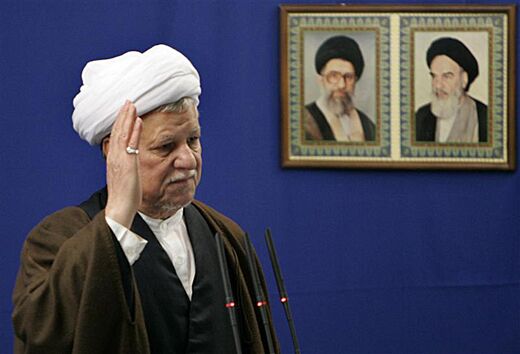
Rafsanjani on the Rise in Iran
Editor’s Note: At time of publishing of this article, Rafsanjani was actually the first deputy chairman of the Assembly of Experts. He won the most votes of all candidates in the December 2006 election for the assembly. On September 4, 2007, he became the chairman.
Former Iranian President Ali Akbar Hashemi Rafsanjani has become the head of Iran’s 85-member Assembly of Experts—the body that elects the supreme leader and which has the most influence in the nation—following elections last month.
In addition, with Supreme Leader Ayatollah Ali Khamenei apparently in failing health, and speculation that Mahmoud Ahmadinejad could be out of favor with the clerical establishment, it appears Rafsanjani could soon become even more influential in the Islamic Republic.
The renewed popularity of Rafsanjani, who is seen by many as a pragmatic, more moderate leader, may be viewed by some as a positive sign that Iran will take a path more aligned with U.S. interests in the future. However, as the Trumpet has pointed out before, Iran under the influence of Rafsanjani will have precisely the same goals as under any more radical leader. Rafsanjani will do nothing to change Iran’s goals in the region and beyond—and may well speed up their fulfillment. For, while Rafsanjani’s persona actually hides an American-hating, terrorist-supporting cleric, that persona could make it easier for the U.S. to eventually do a “deal with the devil” over Iraq, making its exit, at some point, more politically acceptable.
“The restoration of Rafsanjani to the presidency would be welcomed by officials in Washington, who see the former Iranian leader as someone whom they can engage in serious negotiations,” Stratfor reported January 5.
Such a scenario would be to Tehran’s advantage only, however. For as Stratfor asserted, despite losses for the conservative faction in December’s election, no Iranian foreign policy shift will result. “… Ahmadinejad’s losses in both elections [municipal and Assembly of Experts] will not cause any major shift in Tehran’s nuclear program or its policy toward Iraq” (Dec. 22, 2006). The U.S. would be dealing with the same beast, only in a more sophisticated guise.
The Trumpet has previously explained that the so-called moderates and the hardliners in Iran have precisely the same ambitions for their nation: domination of the Middle East, development of nuclear power, and the downfall of America. The nation’s agenda is set by the clerical establishment, and the various political factions and personalities are used to achieve the same ends.
In the context of politics, we would do well to take note of Iran’s modus operandi: “The Islamic doctrine of war is clear: deception informs war. According to the Prophet Muhammad, in al-Bukhari, chapter 73, hadith no. 1298: ‘Verily, war is deception,’ sometimes translated succinctly as ‘war is deceit’” (National Observer, June 22, 2006).
Whether the face Iran shows to the world is a radical extremist like Ahmadinejad or a “moderate” politician like Rafsanjani, we can be sure the ruling mullahs—those with the true power, under the supreme leader—know what they are doing, and are doing it for a reason.
In any case, even a cursory glance at Rafsanjani’s history and statements reveals a man in no sense moderate. Rafsanjani was a pillar of the 1979 Iranian Islamic Revolution before becoming president a decade later. As leader of the Iranian government, Rafsanjani actively and openly supported terrorism around the world and spent billions to rebuild Iran’s military. Under his watch, Iran acquired missiles and nuclear hardware and stockpiled chemical weapons (U.S.News & World Report, Nov. 14, 1994).
As for how he really feels about America, this is what he had to say in an interview in September 2003: “Even though the United States has a physical presence in the countries that surround us, the reality is that the United States is in fact surrounded by Iran. … Our enemies such as Saddam, the Taliban and the Monafeghins [an Iranian opposition group] have been swept out of our way, and soon the U.S. will be too” (Agence France Presse, Sept. 11, 2003; emphasis ours).
Concerning Iran’s nuclear program, Rafsanjani declared the need for an “Islamic bomb” in a speech at Tehran University five years ago (Time, May 22, 2005). In 2005, he said Iran would never abandon its nuclear program (Stratfor, May 19, 2005). And last year, he vocally supported Ahmadinejad’s stance in rejecting the United Nation’s demand that Iran halt its nuclear program.
“Rafsanjani is a dealmaker, first and last,” and Iran’s “most clever politician” (Time, op. cit.). As such, it’s not hard to guess why he is currently being promoted in Iran and his name being floated as possibly the country’s next leader—now, at a time when America desperately wants an accommodation with Iran over Iraq, without appearing to deal with the enemy.
We should not underestimate Tehran.
As theTrumpet.com wrote in November 2005, a few months into Ahmadinejad’s presidency:
Even should the public image of the republic change with a new leader at some point, the real power will remain with the ruling religious regime. In fact, because Ahmadinejad is so radical in his approach and rhetoric, he would make any more opportunistic conservative—such as Rafsanjani—appear positively moderate to the West by comparison. Should someone like Rafsanjani gain power sometime in the future, one could easily envisage the U.S. welcoming such a leader with open arms. But again, the danger to the West would be the same.
